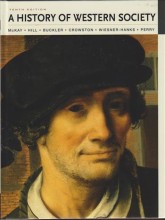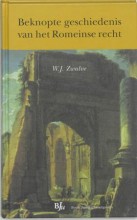Samenvatting: A History Of Western Society | 9780230121027 | John P McKay
- Deze + 400k samenvattingen
- Een unieke studie- en oefentool
- Nooit meer iets twee keer studeren
- Haal de cijfers waar je op hoopt
- 100% zeker alles onthouden
Lees hier de samenvatting en de meest belangrijke oefenvragen van A History of Western Society | 9780230121027 | John P. McKay
-
2 The Crisis of the Later Middle Ages
-
2.1 Prelude to Disaster
Dit is een preview. Er zijn 1 andere flashcards beschikbaar voor hoofdstuk 2.1
Laat hier meer flashcards zien -
Wat waren de gevolgen van het kouder worden van het klimaat?
- Door misoogsten rezen de prijzen dit leidde tot: de Grote Hongersnood van 1315-1322- Het gezinsleven werd verstoord door het zoeken naar voedsel, vaak verkocht men hun hele hebben en houden- De hongersnood zorgde voor meer opstanden tegen de regering, ook hadden de landen veel invloed op elkaar, zodat een crisis in een land Europese gevolgen had -
Wanneer was de eerste uitbreek van de pest? En wat waren de gevolgen?
De eerste Pestgolf was van 1347-1351 en doodde 1/3 van de bevolking van Europa. -
Korte termijn gevolgen van de pest waren:
- Immense sterfte en schrik- Wanorde, landvlucht, 'supply crisis', stijgende prijzen- Reactie overheden: arbeid aan land gebonden, lonen vast; opstanden -
Lange termijn gevolgen van de pest waren:
- Stabilisering situatie en daling prijzen; verhoging reeël loon- Sociale mobiliteit en vernieuwing instituties- Arbeidsbesparende innovatie- Groei universiteiten; rol lekenvroomheid -
Wat waren de voornaamste manieren om de pest de bestrijden?
- Het zuiveren van lucht van gif- Het in balans brengen van de vloeistoffen in het lichaam -
Wat voor effecten had de Pest op de economie?
Door het ontbreken van arbeiders daalde de productie en stegen de prijzen. De arbeider verkeerde in een handelspositie die gunstig was voor het loon. En ook werden er veel nieuwe ambachtslieden toegelaten in bijvoorbeeld gilden. -
2.3 The Hundred Years' War
Dit is een preview. Er zijn 1 andere flashcards beschikbaar voor hoofdstuk 2.3
Laat hier meer flashcards zien -
Wat waren de oorzaken van de 100 jarige oorlog?
- Problemen over de opvolging van de Franse kroon, deze zou toebehoren aan Edward, als neef van de laatste koning, maar werd aan het huis Valois gegeven- Problemen met het hertogdom Aquitane, dat werd veroverd door Filip VI -
Wat waren belangrijke punten in de Honderdjarige Oorlog?
- Crécy in 1346, Engelse schutters met longbows hakken Franse in de pan- Poitiers 1356, de Franse koning wordt gevangen door de Engelsen en de Engelsen veroveren Aquitane- Agincourt 1415, na een korte vrede pakt de oorlog hier weer op, met dank aan longbowmen verslaat Henry V de Fransen. -
Wat zorgde voor de ommekeer in de Honderjarige Oorlog?
Joan d'Arc werd in 1412 geboren en in 1428 overtuigde zij de koning dat zij de stemmen van engels hoorden. Zij zorgden voor de herovering van Orleans, en vele andere gebieden. Maar werd in 1431 op de brandstapel vermoord. In 1456 werd zij Heilig verklaard. -
Wat waren opmerkelijke dingen die gebeurde na de Honderdjarige Oorlog?
- De economie was naar de knoppen.- Dit leidde tot het opkomen van representatieve genootschappen, deze leidde in Engeland tot het ontstaan van het Parlement. In 1341 gaf Edward het Parliament de macht over belastingen en kon hij zonder hun toestemming geen belasting meer opleggen.- In Frankrijk kwam geen parlement door het gepolariseerde Franse gedachtengoed.- Beide landen werden nationalistischer.
- Hogere cijfers + sneller leren
- Niets twee keer studeren
- 100% zeker alles onthouden
Onderwerpen gerelateerd aan Samenvatting: A History Of Western Society
-
The Crisis of the Later Middle Ages
-
European Society in the Age of the Renaissance - Intellectual Change
-
Reformations and Religious Wars - The Early Reformation
-
Reformations and Religious Wars - The Reformation and German Politics
-
Reformations and Religious Wars - The Catholic Reformation
-
European Exploration and Conquest - World Contact Before Columbus
-
European Exploration and Conquest - The European Voyages of Discovery
-
European Exploration and Conquest - The Impact of Conquest
-
European Exploration and Conquest - Europe and the World After Columbus
-
European Exploration and Conquest - Changing Attitudes and Beliefs
-
European Exploration and Conquest - Norton
-
European Exploration and Conquest - Rossem
-
Absolutism and Constitutionalism - Seventeeth-Century Crisis en Rebuilding
-
Absolutism and Constitutionalism - Absolutism in France and Spain
-
Absolutism and Constitutionalism - The Development of Russia and the Ottoman Empire
-
Absolutism and Constitutionalism - Alternatives to Absolutism in England and the Dutch Republic
-
Toward a New Worldview - The Enlightenment
-
Toward a New Worldview - Enlightened Absolutism
-
The Expansion of Europe - Working the Land
-
The Expansion of Europe - The Growth of Rural Industry
-
The Expansion of Europe - Building the Global Economy
-
The Revolution in Politics - Background to Revolution
-
The Revolution in Energy and Industry - The Industrial Revolution in Britain
-
The Revolution in Energy and Industry - Industrialization in Continental Europe
-
The Revolution in Energy and Industry - Relations Between Capital and Labor
-
Ideologies and Upheavals - The Aftermath of the Napoleonic Wars
-
Ideologies and Upheavals - The Spread of Radical Ideas
-
Ideologies and Upheavals - Reforms and Revolutions Before 1848
-
Ideologies and Upheavals - The Revolutions of 1848
-
Life in the Emerging Urban Society - Taming the City
-
Life in the Emerging Urban Society - Rich and Poor and Those in Between
-
Life in the Emerging Urban Society - The Changing Family
-
Life in the Emerging Urban Society - Science and Thought
-
The Age of Nationalism - Napoleon III in France
-
The Age of Nationalism - Nation Building in Italy and Germany
-
The Age of Nationalism - The Modernization of Russia and the Ottoman Empire
-
The Age of Nationalism - The Responsive National State 1871-1914
-
The West and the World - Industrialization and the World Economy
-
The West and the World - The Great Migration
-
The West and the World - Western Imperialism, 1880-1914
-
The West and the World - Responding to Western Imperialism
-
War and Revolution - The Russian Revolution
-
War and Revolution - The Peace Settlement
-
The Age of Anxiety - Modernism in Architecture, Art, and Music
-
The Age of Anxiety - The Search for Peace and Political Stability
-
The Age of Anxiety - The Great Depression, 1929-1939
-
Dictatorship and the Second World War, 1919-1945 - Authoritarian States
-
Dictatorship and the Second World War, 1919-1945 - Stalin's Soviet Union
-
Dictatorship and the Second World War, 1919-1945 - Mussolini and fascism in Italy
-
Dictatorship and the Second World War, 1919-1945 - Hitler and Nazism in Germany
-
Dictatorship and the Second World War, 1919-1945 - The second world war
-
Cold War Conflict and Consensus - Postwar Europe and the Origins of the Cold War
-
Cold War Conflict and Consensus - The Western Renaissance
-
Cold War Conflict and Consensus - Soviet Eastern Europe
-
Cold War Conflict and Consensus - The end of Empires
-
Cold War Conflict and Consensus - Postwar Social Transformations
-
Challenging the Postwar Order - Reform and protest in de 1960s
-
Challenging the Postwar Order - Changing Consensus in Western Europe
-
Challenging the Postwar Order - The Decline of "Really Existing Socialism
-
Challenging the Postwar Order - The Revolution of 1989
-
Nationalism in Asia 1914-1939
-
Bentley Retreat from Empire






























